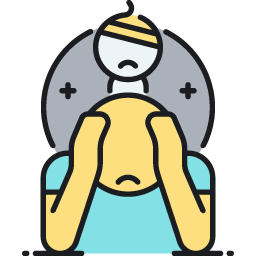
The starting cue for this pattern of responses is that we are hurt by or feel vulnerable with our partner and become suddenly out of control. Emotional safety is lost.
When we are alarmed, we use anything that promises to give us back this control. We can do this by defining our partner in a negative way, by shining a black light on him or her. We can attack to reactive anger or as a preemptive strike.
"Find the Bad Guy" could just as easily called, "Its You Not Me, Its You." When we feel cornered and flooded with fear, we tend to see and go with the obvious. I can see and I can feel what you just did to me. It is much harder to see the impact of my responses on you. We concentrate on each step and how "you just stepped on me," not the whole dance.
After a while, the steps and patterns become automatic.
Couples become stuck and unresolved.
Once we get stuck in a negative pattern, we expect it, watch for it, and react even faster when we think we see it coming. Of course this only reinforces the pattern.
"I am waiting for the put down and I have my verbal gun ready," shares one client.
By being wary and anticipating hurt, we close off all the ways out of the dead-end dance. We cannot relax with our partners, and we certainly cannot connect with or confide in them. The range of responses and habitual feed back loop becomes more restricted, slowly deadening the relationship.
Stopping "The Bad Guy Dance" is the first step to becoming best friends again.
These questions and reflections can hep you think about how you and your mate move in the dance when both of you get caught in the fight-to-win mode.
You can ponder them, write them down, read them aloud, and, of course share them with your partner.
See if you can remember an incident with your spouse or partner.
What did you use to "win" the fight?
How did you prove your innocence?
How did you accuse your partner?
What are your usual comebacks when you feel cornered?
Can you sketch out the hostile criticism and labeling that trapped you both?
How did each of you begin to defend he other?
How did each of you wound and enrage the other?
Was there a "winner"? (Probably not).
What happened after the "Bad Guy" fight?
Were you able to go back and console each other?
If not, how did you deal with the loss of safety between you?
How did you feel about yourself and your partner?
What do you think might have happened if you had said, "We are starting to label each other, to prove the other one is the bad one here. We are jut getting to hurt more if we get stuck in this dance. Let's not get caught in an attack-attack dance with each other. Maybe we can talk about what happened without it being someone's fault?"
Taken from the book, Hold Me Tight
Dr. Sue Johnson


 RSS Feed
RSS Feed
